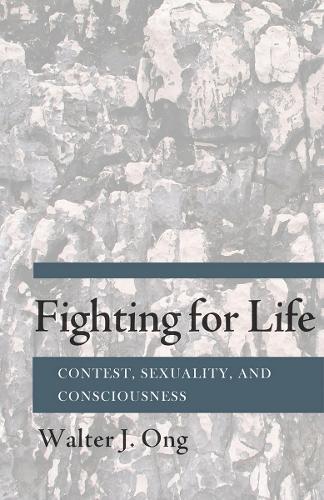Overview
What accounts for the popularity of the macho image, the fanaticism of sports enthusiasts, and the perennial appeal of Don Quixote's ineffectual struggles? In Fighting for Life, Walter J. Ong addresses these and related questions, offering insight into the role of competition in human existence. Focusing on the ways in which human life is affected by contest, Ong argues that the male agonistic drive finds an outlet in games as divergent as football and chess. Demonstrating the importance of contest in biological evolution and in the growth of consciousness out of the unconscious, Ong also shows how adversary procedure has affected social, linguistic, and intellectual history. He discusses shifting patterns of contest in such arenas as spectator sports, politics, business, academia, and religion. Human beings' internalization of agonistic drives, he concludes, can foster the deeper discovery of the self and of distinctively human freedom.
Full Product Details
Author: Walter J. Ong
Publisher: Cornell University Press
Imprint: Cornell University Press
Dimensions:
Width: 14.00cm
, Height: 1.80cm
, Length: 21.60cm
Weight: 0.454kg
ISBN: 9780801478451
ISBN 10: 0801478456
Pages: 277
Publication Date: 14 February 2013
Audience:
College/higher education
,
Professional and scholarly
,
Tertiary & Higher Education
,
Professional & Vocational
Format: Paperback
Publisher's Status: Active
Availability: Manufactured on demand

We will order this item for you from a manufactured on demand supplier.
Reviews
<p> Fighting for Life is a book about contest, the agonia of the Greek arena, and its roots in male life, especially academia. Ong describes this work as an 'excavation' which was prompted by his previous explorations of such areas as the characteristics of oral and literate cultures, Peter Ramus and his 16th-century intellectual milieu, and the early dominance and more recent decline of classical rhetoric in education. In Fighting for Life, he weaves the results of a year's study of agonistic structures running through the biological, social, and noetic worlds. Describing his text as an 'essay in noobiology, ' the biological roots of human consciousness, Ong claims that 'contest has been a major factor in organic evolution and it turns out to have been a major, and seemingly essential, factor in intellectual development.' . . . The work is a valuable synthesis of a wide body of research and theory. -Rhetoric Society Quarterly
Fighting for Life is a book about contest, the agonia of the Greek arena, and its roots in male life, especially academia. Ong describes this work as an 'excavation' which was prompted by his previous explorations of such areas as the characteristics of oral and literate cultures, Peter Ramus and his 16th-century intellectual milieu, and the early dominance and more recent decline of classical rhetoric in education. In Fighting for Life, he weaves the results of a year s study of agonistic structures running through the biological, social, and noetic worlds. Describing his text as an essay in noobiology, the biological roots of human consciousness, Ong claims that contest has been a major factor in organic evolution and it turns out to have been a major, and seemingly essential, factor in intellectual development. . . . The work is a valuable synthesis of a wide body of research and theory. Rhetoric Society Quarterly
Author Information
Walter J. Ong (1912-2003) taught at Saint Louis University for thirty years. His many books include Orality and Literacy, Rhetoric, Romance, and Technology; Interfaces of the Word; and Fighting for Life, the latter three from Cornell.




